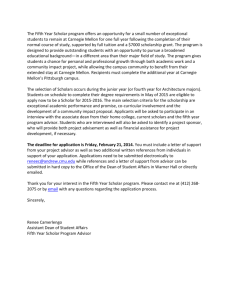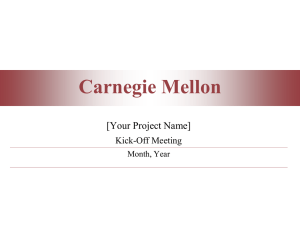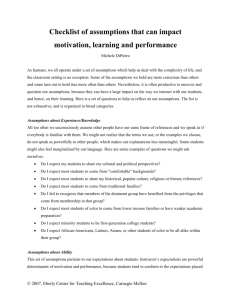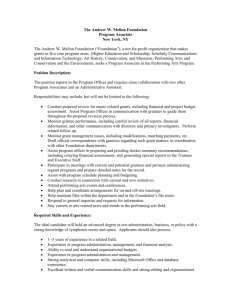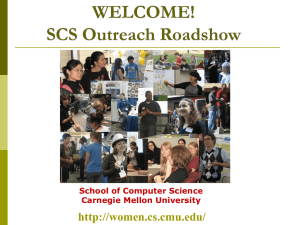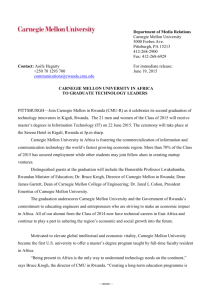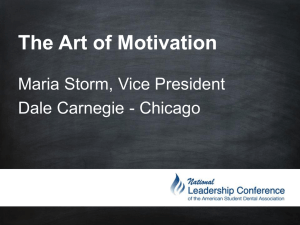Ph.D. RAC Report Form - Biological Sciences
advertisement
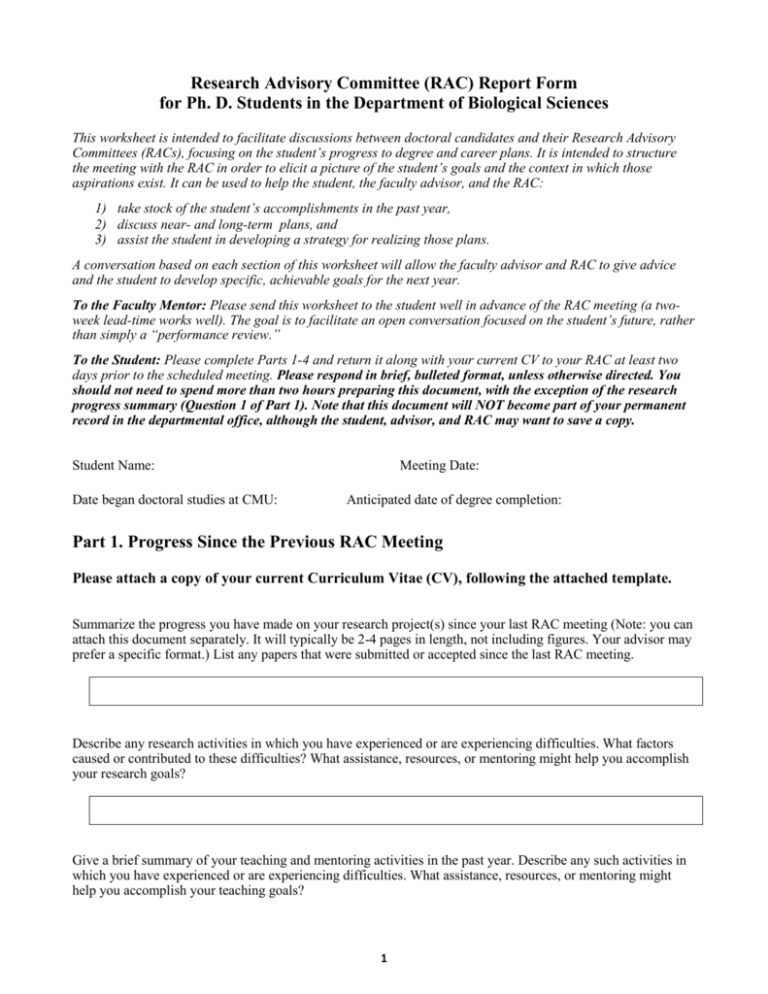
Research Advisory Committee (RAC) Report Form for Ph. D. Students in the Department of Biological Sciences This worksheet is intended to facilitate discussions between doctoral candidates and their Research Advisory Committees (RACs), focusing on the student’s progress to degree and career plans. It is intended to structure the meeting with the RAC in order to elicit a picture of the student’s goals and the context in which those aspirations exist. It can be used to help the student, the faculty advisor, and the RAC: 1) take stock of the student’s accomplishments in the past year, 2) discuss near- and long-term plans, and 3) assist the student in developing a strategy for realizing those plans. A conversation based on each section of this worksheet will allow the faculty advisor and RAC to give advice and the student to develop specific, achievable goals for the next year. To the Faculty Mentor: Please send this worksheet to the student well in advance of the RAC meeting (a twoweek lead-time works well). The goal is to facilitate an open conversation focused on the student’s future, rather than simply a “performance review.” To the Student: Please complete Parts 1-4 and return it along with your current CV to your RAC at least two days prior to the scheduled meeting. Please respond in brief, bulleted format, unless otherwise directed. You should not need to spend more than two hours preparing this document, with the exception of the research progress summary (Question 1 of Part 1). Note that this document will NOT become part of your permanent record in the departmental office, although the student, advisor, and RAC may want to save a copy. Student Name: Date began doctoral studies at CMU: Meeting Date: Anticipated date of degree completion: Part 1. Progress Since the Previous RAC Meeting Please attach a copy of your current Curriculum Vitae (CV), following the attached template. Summarize the progress you have made on your research project(s) since your last RAC meeting (Note: you can attach this document separately. It will typically be 2-4 pages in length, not including figures. Your advisor may prefer a specific format.) List any papers that were submitted or accepted since the last RAC meeting. Describe any research activities in which you have experienced or are experiencing difficulties. What factors caused or contributed to these difficulties? What assistance, resources, or mentoring might help you accomplish your research goals? Give a brief summary of your teaching and mentoring activities in the past year. Describe any such activities in which you have experienced or are experiencing difficulties. What assistance, resources, or mentoring might help you accomplish your teaching goals? 1 List any other relevant research or training-related activities in which you have participated since the previous RAC meeting, including coursework, workshops, scientific meetings, presentations, etc. Part 2. Plans for the Coming Twelve Months Describe the goals of your research project(s) over the coming 12 months. Be as specific as you need to be in order to convey your plans clearly (1-2 pp. is typical). Set a time frame for your goals that distinguishes shortterm plans (to be completed within 3-4 months) from long-term plans (to be completed by the end of the 12 month period) List publications you plan to submit (include proposed publication title, journal, and submission date): List professional conferences you would like to attend (include proposed title and submission date for proposed presentations): How will your doctoral studies be funded during the next 12 months (e.g., Research grant, Fellowship, Teaching Assistantship)? List fellowship, grants, or other funding applications you plan to submit (include name of award and due date): What areas of expertise/understanding and skills would you like to develop over the next 12 months? Think broadly of what you need to be able to know and do: new areas of knowledge, new research techniques, public speaking, writing, managing teams, classroom teaching, negotiation, etc. List your plans for learning these. List any other relevant research or training-related activities in which you plan to participate during the next 12 months, including coursework, workshops, etc. 2 Part 3. Career Goals and Progress List your long-term career goals. You are encouraged to include at least two: 1) 2) What position/job do you see as the next step toward your career goals after graduating? When do you anticipate beginning the process of obtaining that next position? What factors are driving your career goals, plans, and decisions (e.g., interests in research, teaching, business, government, writing; geographic priorities; family commitments; financial objectives)? What steps are you taking to enhance your ability to attain these goals? What additional training or skills would most benefit you in preparing for your desired career? Part 4. Final Discussion Points This final section is an opportunity for the student and advisor to develop action plans for the coming year and to reflect on specific actions that will help the student to be successful. It is useful to consider what is working and should continue, and what might change. What assistance, resources, and mentoring would help you meet your goals? What are your plans for identifying and using these resources? What can your advisor continue to do to support you in reaching your specific research and professional development goals for the coming year? What should he/she do differently? What can you continue to do to achieve your immediate and long term goals? What should you do differently? Adapted for doctoral students in the Department of Biological Sciences at Carnegie Mellon University by the Graduate Advisory Committee, based on a document prepared by the Office of the Vice Provost for Graduate Education, Stanford University, 2011. 3 SAMPLE CV ROBERTA C. SCIENTIST Department of Biological Sciences Carnegie Mellon University 4400 Fifth Avenue Pittsburgh, PA 15213 412-268-XXXX rcs@cmu.edu 1000 Darwin Avenue Pittsburgh, PA 15218 412-247-XXXX EDUCATION Carnegie Mellon University, Pittsburgh, PA Ph. D., Biological Sciences, Expected May, XXXX Dartmouth College, Hanover, NH B.S. in Biology, May 2010 RESEARCH EXPERIENCE Carnegie Mellon University Department of Biological Sciences, May 2011- present Ph. D. Research (Advisor: Dr. Jane F. Hyrum) This work comprises an analysis of regulation of fungal metabolism under different environmental conditions, using biochemical and genetic approaches. Additional Graduate Research (Collaborator; Dr. Jonah Froome) In addition to dissertation work, studied resonant photoemission in rare earth metals. Participated in numerous other experiments, including studies of optically enhanced oxidation of GaAs, and of the band structure of InP. Dartmouth College Undergraduate Research Assistant (Advisor: D. R. Jason), May 2008 – November 2008 Assisted with analysis of embryonic cell fates in the pansy embryo, using microinjection of fluorescent lineage tracers. PUBLICATIONS Scientist, R. C., Frampton, C. A., and Robbins, T. J. Echinonectin: a new embryonic substrate adhesion protein. J. Cell Biol (in press) Ruffins, S.W., Scientist, R. C., and Jason, D. R. (2012) A clonal analysis of secondary mesenchyme fates in the pansy embryo. Dev. Biol. 60, 285-288. AWARDS AND HONORS 4 cell Carnegie Mellon University Department of Biological Sciences, Stupenkopf Award for Outstanding Graduate Research Dartmouth College B.S., Cum laude Dietrich Award for Best Senior Thesis TEACHING EXPERIENCE Carnegie Mellon University Graduate Teaching Assistant, BSC-444, “Biology of Developing Systems”, Fall 2011 Graduate Teaching Assistant, BSC-333, “Advanced Physiology”, Spring 2012 Mentored two undergraduate researchers, Fall 2011- Spring 2013. Dartmouth College Undergraduate Teaching Assistant, Biology 246, “Introduction to Biochemistry, Fall 2009 GRANTS AWARDED Carnegie Mellon University, Mellon College of Science Travel Award, April 2012 Dartmouth College, Small Undergraduate Research Grant, 2008 PATENTS None PRESENTATIONS AT CONFERENCES Scientist, R. C. and Hyrum, D. F. “Growth of Myxanormia formis under anaerobic conditions” Poster presentation, 14th Annual Meeting of American Mycologists, Chicago, IL, May 2012 Scientist, R. C. and Hyrum, D. F. “Effects of thalidomide on fungi” Platform presentation, 78th Annual Toxicology Meeting, Reno, NA, June 2013 OTHER MEETINGS/WORKSHOPS ATTENDED Conference on Stem Cell Biology, Tampa, FL, April 2013 Workshop on Research Ethics, Carnegie Mellon University, Fall 2012 OTHER TRAINING AND PROFESSIONAL EXPERIENCE Member of Student Invited Seminar Committee, Carnegie Mellon University, Fall 2012 Embryology Course, Marine Biological Laboratory, Woods Hole, MA, Summer 2012 5

